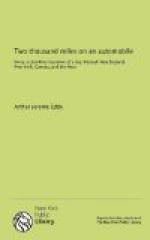Because, therefore, three Presidents have been assassinated, we must not link the crimes together and unduly magnify the dangers of anarchy. At most the two early crimes could only serve to demonstrate how easy it is to reach and kill a President of the United States, and therefore the necessity for greater safeguards about his person is trebly demonstrated. The habit of handshaking, at best, has little to recommend it; with public men it is a custom without excuse. The notion that men in public life must receive and mingle with great masses of people, or run the risk of being called undemocratic, is a relic of the political dark ages. The President of the United States is an executive official, not a spectacle; he ought to be a very busy man, just a plain, hard-working servant of the people,—that is the real democratic idea. There is not the slightest need for him to expose himself to assault. In the proper performance of his duties he ought to keep somewhat aloof. The people have the right to expect that in their interest he will take good care of himself.
As for anarchism, that is a political theory that possesses the minds of a certain number of men, some of them entirely inoffensive dreamers, and anarchism as a theory can no more be suppressed by law than can any other political or religious theory. The law is efficacious against acts, but powerless against notions. But anarchism in the abstract is one thing and anarchism in the concrete is another. It is one thing to preach anarchy as the final outcome of progress, it is quite another thing to preach anarchy as a present rule of conduct. The distinction must be observed, for while the law is helpless against theories, it is potent against the practical application of theories.
In a little book called “Politics for Young Americans,” written with most pious and orthodox intent by the late Charles Nordhoff, the discussion of government begins with the epigram,—by no means original with Nordhoff,—“Governments are necessary evils.”
Therein lurks the germ of anarchism,—for if evil, why should governments be necessary? The anarchist is quick to admit the evil, but denies the necessity; and, in sooth, if government is an evil, then the sooner it is dispensed with the better.
When Huxley defines anarchy as that “state of society in which the rule of each individual by himself is the only government the legitimacy of which is recognized,” and then goes on to say, “in this sense, strict anarchy may be the highest conceivable grade of perfection of social existence; for, if all men spontaneously did justice and loved mercy, it is plain that the swords might advantageously be turned into ploughshares, and that the occupation of judges and police would be gone,” he lends support to the theoretical anarchist. For if progress means the gradual elimination of government and the final supremacy of the individual, then the anarchist is simply the prophet who keeps in view and preaches the end. If anarchy is an ideal condition, there always will be idealists who will advocate it.




